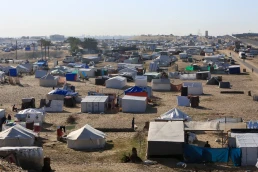What does war do to the nations that fight it?
by Andrea Mazzarinio, Tom Dispatch
Reacting to the terrorist attacks by the Palestinian militant group Hamas that killed more than 1,400 Israelis, Americans have been remarkably focused on whether we should support Israel or the residents of Gaza. In either case, we act as if Israel’s only possible decision was whether or not to launch a war against Gaza. In the country that waged a disastrous 20-year “global war on terror” in response to the 9/11 attacks, it seems strange that there’s been so little discussion about what such a decision might mean in the long term. Going to war is just that — one decision among many possibilities, including taking steps to strengthen and democratize the states where such armed militias may otherwise flourish.
As a co-founder of Brown University’s Costs of War Project, it’s become a focus of mine to show just what’s happened to us because our government, more than two decades after the 9/11 attacks, continues to fight a “war on terror” (whatever that may mean) in some 85 countries. Yes, that’s right: 85 countries! We’ve armed foreign militaries, flown our drones in a devastating fashion, run prisons (often in places with far laxer human-rights standards than ours), trained foreign militaries, and sometimes fought directly alongside them.

Over the years, the 2,977 American lives taken by Osama bin Laden and his followers on September 11, 2001, have exploded into nearly one million lives lost globally thanks to our government’s decision to go to war. Framed by the sheer scale of death and destruction wrought by this country’s forever wars, our hasty retreat from Afghanistan in 2021, long seen as a shamefully botched mission unaccomplished, should instead have been viewed as a genuinely courageous act, even if it was just one of dozens of countries where the U.S. hemorrhaged lives and dollars galore.
Recent Posts
Why Are Democratic Lawmakers Still Meeting With Netanyahu?
July 12, 2025
Take Action Now Pictures show Democrats like Chuck Schumer standing next to Netanyahu, smiling.By Sharon Zhang, Truthout A bipartisan group of…
Stop Israel’s Dystopian “Humanitarian City” Plan—Before It’s Too Late
July 11, 2025
Take Action Now For the past 20 months, the world has watched—and largely enabled—a genocidal campaign in Gaza. Over 55,000 Palestinians have been…
The “Liberal” International Order Is Criminalizing Palestine Protests
July 11, 2025
Take Action Now As Western governments repress Palestine solidarity and enable Israel’s impunity, the “liberal international order” is no longer…
Politicians Are Betraying Gen Z On Climate
July 10, 2025
Take Action Now While Gen-Zers thrift, knit, crochet, and find other ways to reduce our footprints, Trump and the GOP are greenlighting more climate…




